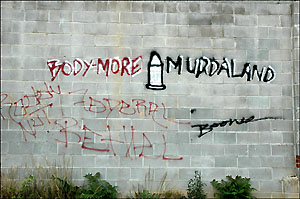Hundreds march in US city to pray against crime wave

A surge in shootings and violent deaths in the U.S. city of Baltimore, Maryland has led police and clergy to join forces and call on citizens to help.
They are responding.
In the last 10 days of June, 40 people were shot, 16 fatally, on the streets of Baltimore, a city of more than 600,000 people.
The crime spree prompted Baltimore officials to ask the community for help.
"I have a big job," said Baltimore mayor Stephanie Rawlings-Blake on local WBAL television. "I get it.

"But as people of faith, WE have a big job. We need people of faith to intercede in a way that we cannot."
Rawlings-Blake, a member of Baltimore's Douglas Memorial Community Church, has a personal stake in ending the violence.
Her own cousin was gunned down near his home last month, according to the Baltimore television station WJZ.
Following the pleas, The Baltimore Sun newspaper reported that hundreds of people from local churches poured out of cars and buses to flood Baltimore streets on Saturday.
They marched and prayed in all of the city's nine police districts, and gathered at street corners and in parking lots.
"Together we're going to push back the darkness," Bishop Marcus A. Johnson Sr. of New Harvest Ministries told a crowd gathered at police headquarters Saturday before the drive began, according to the Sun.
The event was called Bless Baltimore Prayer Motorcade by organizers.
"On Saturday the most violent areas of the city were inundated by police, prayer and people motivated by faith," said Sarah Samson of WBAL. "It comes on the heels of an especially deadly week in Baltimore."
There have been 117 homicides in Baltimore in 2013, the highest rate in six years.
"We are at crisis level," said City Councilman Nick Mosby, who the Sun said represents areas on the city's west side hit particularly hard by recent violence. "It's not going to get better with business-as-usual procedures."
A group of 200 people attended a rally led by Mosby on Friday, marching through the streets singing religious songs.
"We outnumber the bad guys," he told the Sun.
"If you put a police officer in every block, you still could not solve the program when the problem is inside of the individual," said Bishop Angel L. Nunez of Bilingual Christian Church.
On the march, local resident Pearl Wilson was quoted in the Sun saying, "My kids, they're growing up in this. I'm scared for them, I'm scared for everybody," Wilson said. "I'm trying to get out of Baltimore."
Joseph Polllini, a professor at New York's John Jay University of Criminal Justice, told the Sun that when crime rises, people in those areas feel trapped in their homes.
"They're not out there marching in the streets, most of the time people are just apathetic to everything and lock themselves in the house," he said.
An unidentified marcher told WBAL, "We need to bring God out on the streets so that they know that there is some hope. They are losing hope on everything. So we are out here showing that there is hope."
The Sun reported that until the recent surge in violence, Baltimore officials were pleased with the way crime was trending in their city, although it has one of the highest murder rates in the United States.
However, the Sun noted that other U.S. cities of the same size have also seen an increase in homicides. On the other hand, Baltimore's neighbor Washington, D.C. only had 88 homicides all of last year.
The police chief of Baltimore has regularly blamed the increase in crime on the arrival of a gang called The Black Guerilla Family, which entered Baltimore from California last autumn.
Baltimore resident Munir Bahar told the Sun, "Folks are killing women. Folks are killing kids. The police are doing their part. The city is doing its part. It's time for the community to step up. It's a state of emergency."
One of the most popular television series of all time, HBO's crime drama The Wire, was set in Baltimore. Airing between 2002 and 2008, the show fueled the city's reputation as a gritty, crime-infested community.
It is a reputation local leaders are seeking to overcome.
"When we have a spike, we have cameras from all over the city, outside of the city, national reporters," Rawlings-Blake told her audience. "I welcome them back for the miracle. I know that as you are standing here, you are not going to tolerate it."